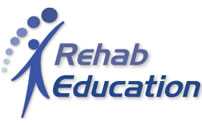Alliance Member:
Code:
To register for this course, go to: http://www.rehabedge.com/detail.aspx?id=7092
Neural Mobilization: Examination & Intervention Strategies
Rehab Education

Format(s): Live Seminars
Discipline(s): Physical Therapy / Occupational Therapy
Contact Hours: 15
Registration Fee: $499.00
Objectives
By the end of this course, participants will:
Identify the 3 components of the brachial plexus
Describe 3 possible pathologies of the nervous system as covered in this course
Identify 3 symptoms of brachial plexopathy of the upper quadrant
Following the course and given 3 case scenarios the participant will match all appropriate testing of the UE using novel neural mobility grading scales (0-5) for biasing the Brachial Plexus, Radial, Median and Ulnar nerves
Apply 3 basic treatment techniques based on results obtained from neural mobility testing of the upper extremity for a patient with lateral epicondylagia.
Apply 2 basic treatment techniques based on results obtained from neural mobility of the LE with metric measurements (of the hip or knee) using: the Straight Leg Raise with biasing of the Tibial and Fibular nerves, Prone Knee bend with biasing of the Femoral and Saphenous nerves for a given case study.
Apply the concept of structural differentiation as referenced in the literature to determine neural vs non-neural tissue movement restrictions of the UE through joint positioning, palpation and symptom behavior
Apply the concept of structural differentiation as referenced in the literature to determine neural vs non-neural tissue movement restrictions of the LE through joint positioning, palpation and symptom behavior
Design a comprehensive intervention plan including exercises, manual techniques and home exercises based on exam results from a given case study
Target Audience
PT, PTA, OT, OTA, AT
Confirmation Notes
Agenda
Day 1
7:30 - 8:00 Registration
8:00 - 9:00 Introduction of Topic
Anatomy and Physiology
Pathology
9:00 - 10:30 Palpation Lab
10:30 - 10:45 Break
10:45 - 12:00 Mobility Assessment Lab Part 1
12:00 - 12:45 Lunch
1:00 - 2:30 Mobility Assessment Lab Part 2
2:30 - 2:45 Documentation of Findings
2:45 - 3:00 Break
3:00 - 3:15 Indications for Neural Mobility Assessment
3:15 - 5:30 Basic Teaching Case Studies Lab/Lecture
Concepts covered: misdiagnosed conditions, structural differentiation, test modification to track outcomes. Treatment principles: flossing, tensioning
Meralgia Paresthetica
Lateral epicondylalgia
Restless leg syndrome
TKR with persistent burning in the anterolateral lower leg
Little league elbow
Softball player with eversion sprain from sliding into second base
Day 2
8:00 - 8:30 Literature review
8:30 - 10:00 Review of examination techniques Lab
10:00 - 10:45 The Thoracic Outlet Syndrome
10:45 - 11:00 Break
11:00 - 11:45 Examination and Treatment Lab
11:45 - 12:30 Complex Case Studies and Problem Solving Lab
Focus activities: Identify potential sources of symptoms, develop examination strategy, provide comprehensive intervention plan
Baseball pitcher with “Dead Arm” syndrome and SICK Scapula
Marathon runner with buttock, thigh, and heel pain – no back pain
12:30 - 1:30 Lunch
1:30 - 2:45 Complex Case Studies and Problem Solving: Lab Part 2
Stockbroker who recently returned to surfing with facial and chest wall pain + numbness of the ring and small fingers.
LPN with burning along the medial scapular border, posterior shoulder, lateral epicondyle and into the dorsum of the hand occurring after transferring a patient
Weekend tennis player – recovering from Achilles tendon repair with persistent burning along the lateral heel
2:45 - 3:00 Break
3:00 - 4:00 Continued- Complex Case Studies
4:00 - 4:15 Post-Test
4:15 - 4:30 Review, Q & A
Description
The concept of restricted neural dynamics is not new, however its impact on our Neural Mobilization patients’ daily activities and movement tolerance is often overlooked during the examination and treatment of our patients. This course covers concepts for examination and quantifying restricted neural dynamics and intervention strategies to address the dura, nerve bed, and peripheral nerves.
Included is a critical review of the most up-to-date literature in peer-reviewed journals regarding the use of neural mobilization as an examination and treatment technique. This course is appropriate for physical therapists, occupational therapists, and athletic trainers; both assessment and treatment concepts will be covered to aid in the care of their patients. This course includes laboratory sessions in which participants will practice neural mobilization and examination techniques.
Participants are encouraged to wear loose, comfortable clothing. Shorts are recommended as well as halter or swim suit tops for women in order to allow for proper practice of techniques.
Course Prerequisite: EB abstracts will be emailed to participants prior to the course.
During hands-on lab sessions, the course instructor(s) will evaluate each participant’s techniques/skills learned to determine proficiency for course completion. If 3/5 criteria are not attained the instructor will work with the attendee until all the criteria is met. Post test at end of course will be used as a tool to review answers and rationale, ensuring attendees have gained all content knowledge.
Dates and Locations
| |
Register
Address:
, Atlanda, Georgia
Location:
Dates:
06-01-2024 - 06-02-2024
Instructor(s):
Accommodation(s):
|
Register
Address:
, Somerset, New Jersey
Location:
Dates:
11-09-2024 - 11-10-2024
Instructor(s):
Accommodation(s):
|